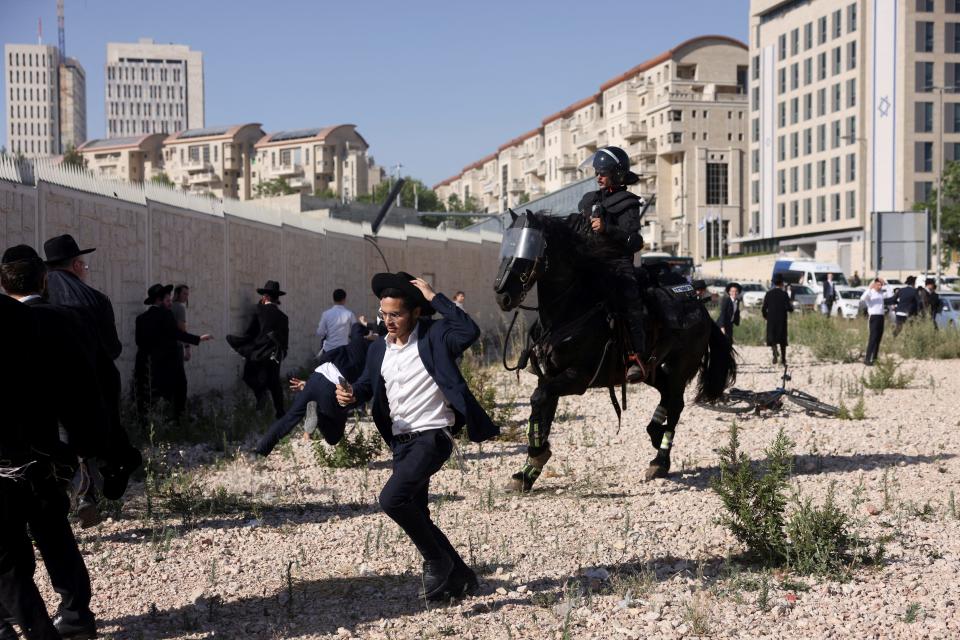Israel court ends draft exemptions for ultra-Orthodox Jews
JERUSALEM (Reuters) - Israel's Supreme Court ruled on Tuesday that the state must begin drafting ultra-Orthodox Jewish seminary students into the military, a decree which creates new political strains for embattled Prime Minister Benjamin Netanyahu.
Netanyahu's Likud party said the Supreme Court's ruling was "perplexing," given ongoing efforts in parliament to agree on a new conscription law that would address the problem.
The prime minister's coalition government relies on two ultra-Orthodox parties that regard conscription exemptions as key to keeping their constituents in religious seminaries and out of a melting-pot army that might test their customs.
Leaders of those parties said they were disappointed with the ruling but issued no immediate threat to the government.

However, the prospect of the military, backed by Defence Minister Yoav Gallant, starting to draft seminary students could widen cracks in Netanyahu's increasingly brittle coalition.
The ultra-Orthodox conscription waiver has become increasingly charged in Israel as its armed forces are overstretched by a multi-front war with Hamas in Gaza and Hezbollah in Lebanon.
"At the height of a difficult war, the burden of inequality is more than ever acute," the court's unanimous ruling said.
Israelis are bound by law to serve in the military from the age of 18 for 24-32 months. Members of Israel's 21 percent Arab minority are mostly exempt, though some do serve, and ultra-Orthodox Jewish seminary students have also been largely exempt for decades.
The law governing the exemption for seminary students expired last year, but the government continued to allow them not to serve. The Supreme Court ruled that in the absence of a new legal basis for the exemption, the state must draft them.
Adding further pressure on the ultra-Orthodox coalition parties, the ruling also barred seminaries from receiving state subsidies if scholars avoid service without deferrals or exemptions.
Education Minister Yoav Kisch voiced hope that agreement could be reached on a compromise.
"Not in a civil war, not in a fight that will tear apart Israeli society in the middle of a tough war. It's possible to do it together," Kisch said.
Political scientist Gideon Rahat, of the bi-partisan Israel Democracy Institute, said the ruling had piled fresh pressure on Netanyahu. "He will try to buy time and make every effort to remove this issue from the public agenda," said Rahat.
Preserving traditions
While the military has said it is in dire need of more conscripts, ultra-Orthodox leaders see the exemptions as existential for preserving their traditions.
"There's no judge there who understands the value of Torah study and its contribution to the people of Israel throughout the generations," said ultra-Orthodox lawmaker Moshe Gafni, who heads the powerful parliamentary Finance Committee, referring to study of Judaism's holy books.

Opposition parties welcomed the ruling.
"There's nothing Jewish about dodging military service," said opposition lawmaker and former defence minister Avigdor Lieberman.
For more than six years, the state had been asking the Supreme Court for more time to pass a new conscription law to resolve the issue.
The new draft bill being hammered out in parliament could resolve the crisis if wide agreement is reached. Otherwise, it could have the potential to bring Netanyahu's government down.
Gallant, who has taken up independent positions against Netanyahu on more than one occasion, wants a more equal sharing of the burden, a sentiment shared by several other lawmakers in Netanyahu's Likud party and among most of the opposition.
The military waiver for the ultra-Orthodox has sparked protests in recent months by Israelis angry that they are shouldering the risk of fighting the war in Gaza. In city streets, ultra-Orthodox demonstrators have blocked roads under the banner "death before conscription".
The waivers also have wider economic impact. The ultra-Orthodox make up 13% of Israel's 10 million population, a figure expected to reach 19% by 2035 due to their high birth rates.
The conscription waiver keeps some of the community in seminaries and out of the workforce, hindering economic growth and placing a welfare burden on middle-class taxpayers.
Reporting by Maayan Lubell and Ari Rabinovitch
This article originally appeared on USA TODAY: Israel court ends draft exemptions for ultra-Orthodox Jews
